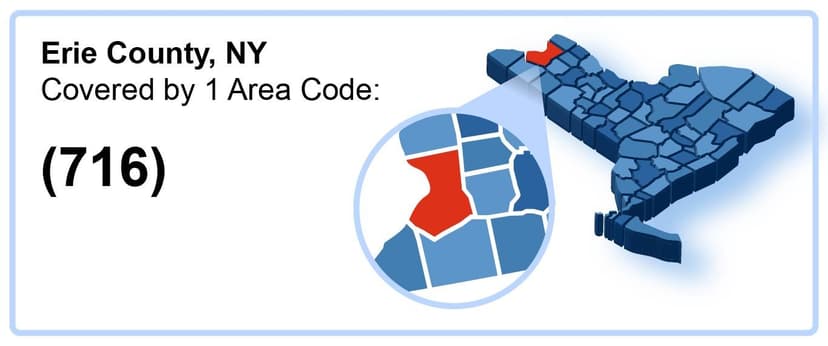What are Erie County Area Codes?

Area codes are the three digits that begin telephone numbers. They are dialed before local numbers when calling persons in different numbering plan areas. Area codes identify Numbering Plan Areas (NPAs) within states, as allocated by the North American Numbering Plan (NANP).
The only active area code serving Erie County is 716:
Area Code 716
Area code 716 is a New York telephone area code in the NANP. Created in 1947, it serves Erie County and parts of other New York counties. Places covered by the 716 area code in Erie County include Buffalo, Tonawanda, Alden, Clarence, Boston, Gowanda, Akron, and North Collins.
The New York Department of Public Service (DPS) is responsible for implementing and administering area codes in New York State, including Erie County.
What are the Best Cell Phone Plans in Erie County?
In the last decade, cell phone adoption for telephony services has grown tremendously in New York State. According to a CDC survey in 2018, only 6% of adults in the state still solely used landlines for telecommunication. The number of adults that had adopted cell phones as their only choice for communication made up 38.8% of the demographic.
Erie County is served by all four major phone carriers, Verizon, AT&T, Sprint, and T-Mobile. Within the City of Buffalo, all four provide good network service and coverage. While Sprint covers about 68% of the city, T-Mobile’s coverage extends to about 96% and is the best of all four. Verizon covers about 88% of the city, and AT&T provides 82% coverage in Buffalo.
Erie County residents can use Voice over Internet Protocol (VoIP) services as an alternative to wireless and landline telephone services. Users must have internet-enabled devices to be able to place and receive VoIP calls. VoIP offers all the features of regular telephony services, but uses different transfer mediums (IP networks) and is available at more affordable rates.
What are Erie County Phone Scams?
Erie County phone scams are fraudulent acts to steal money and valuable information from county residents using telephone services. Phone scammers use different types of schemes to get targets to yield to their demands. It is the responsibility of the Erie County Office of Consumer Protection to protect consumers from scams. The New York State Division of Consumer Protection (NYSDCP) educates residents about scam alerts and proffers ways to avoid them. The Division is at the forefront of consumer protection in the state, and it receives phone scam complaints from residents. The Erie County Sheriff's Office also plays a vital role in sensitizing residents on how to identify and avoid phone scams. Residents can avoid falling for phone scams by using reverse phone number lookup services. The commonly reported phone scams in Erie County include:
What are Lottery Scams?
To win a lottery, you must first purchase a ticket. If someone calls to notify you that you won a lottery you did not enter, hang up immediately. It is a ploy to defraud you or steal your personal information. Report the call to the NYSDCP by calling (518) 474-8583.
In lottery phone scams, fraudsters pose as lottery agents and request upfront fees and taxes on "winnings" from their targets. They also ask targets to provide their bank account details and government-issued IDs for identity verifications. It is important to note that foreign lotteries are illegal in the US. Erie County residents should also know that they do not have to pay fees to claim legal lottery winnings. Winners only pay taxes after receiving their winnings. If you did not enter a lottery and received this type of call, or have fallen victim, file an online report with the DCP.
What are COVID-19 Scams?
Following the coronavirus outbreak, the Erie County Department of Health constituted contact tracing teams to curb its spread within the county. Phone scammers have capitalized on this to con residents and steal their money and financial information. Scammers call and inform targets that they have been in contact with coronavirus patients and have to self-isolate and get tested. The scammers request the targets’ credit card information to pay for the test kits, results, and delivery costs.
The Erie County Office of Consumer Protection (ECOCP) warns residents to beware of such calls. They advise that contact tracers will never request payments for test kits or ask for financial information. Legitimate contact tracers also do not mail COVID-19 test kits. If someone contacts you with this scheme, note the phone number and file a report with the ECOCP by calling (716) 858-6169. Residents who have fallen for this scam can also file online complaints with the ECOCP. A reverse phone lookup can verify if the caller is from a legitimate organization.
What are Arrest Warrants Scams?
The Erie County Sheriff's Office (ECSO) warns residents to be wary of scammers posing as employees of the County Sheriff's Office and contacting them. The scammers impersonate Sheriff’s deputies and typically use threats to coerce their targets into acceding to their demands. Phone number lookups can help ascertain if these calls are from legitimate deputies.
The callers tell their targets that warrants are out for their arrest. In most cases, they spoof Caller IDs to display the County Sheriffs’ numbers when calling. They claim the warrants were issued for such offences as missed jury duties, missed court dates, and unpaid tickets and fines. The scammers then say they will cancel the warrants if the targets pay the fines. They ask for payments by prepaid cards or wire transfers. You should know that if there is a warrant out for your arrest, law enforcement agents will not call you. They will either mail it or bring it to you in person. If you receive this type of call from someone claiming to work for the ECSO, hang up the phone immediately. Verify the caller’s claim with the County Sheriff's Office, by calling (716) 858-7618. Victims of arrest warrant phone scams in Erie County can report the incident online to ECSO for investigations.
What are IRS Scams?
The Internal Revenue Service (IRS) scam has many variations but all aim to steal unsuspecting taxpayers' identities and money. Residents should never disclose their social security numbers to unknown persons who claim to be IRS employees or other government agents.
A scammer will contact you by text message to inform you that your Treasury Department FCU account has expired. To renew it, they will include a phone number for you to call. If you receive a text message like this, verify its authenticity from the Treasury Department Federal Credit Union by calling 1 (800) 344-4497. Do not call the number provided in the text message nor disclose any personal information. The IRS confirms that it does not initiate contact with taxpayers by phone. Victims of these scams divulge sensitive information, such as their SSNs and bank information, to scammers. Erie County residents who believe they are victims of IRS scams can report to TIGTA by calling 1 (800) 366-4484. The FTC also takes reports of IRS scams on its online complaint channel.
What are Robocall and Spam Calls?
Scammers target county residents with automated phone calls in attempts to defraud them. These automated phone calls deliver recorded messages and are known as robocalls. Robocalls are legitimately used by telemarketing and political organizations to reach a wide audience and scammers have adopted robocalls for this reason. Scammers can change robocall numbers or spoof Caller IDs to display different numbers thereby concealing their identities and making it difficult to track them. Erie County residents who fall victim to robocall scams can report to the FTC by calling 1 (888) 382-1222.
Steps to take when you receive a robocall include:
- Register your phone number on the FTC's Do Not Call List. You will likely still receive unsolicited calls after registration, but these can be treated as potential scam calls.
- Hang up if a robocall comes through your phone. If you answer it and act on the prompts provided to remove your number from its call list, you will only confirm your number and receive more unsolicited calls.
- Ask your phone carrier if it offers call-blocking services and if the services are free, use them to have robocall numbers blocked. Because robocall numbers can be easily changed, look for free call-blocking tools.
- File complaints about illegal robocalls and spam numbers with the FTC. You can also report illegal spam calls to the Federal Communications Commission (FCC).
How Can You Spot and Report Erie County Phone Scams?
Scammers rely on Erie County residents' ignorance to steal their money and identities. Having the right information can prevent more residents from falling victim to these scams. Phone number lookup services are useful for retrieving unknown callers' names and addresses, which can help avoid phone scams.
There are many ways to identify phone scams in Erie County. These include:
- Scammers use pressure tactics to get what they want from their targets. Be cautious of an unknown caller who tries to coerce you to pay money or provide information.
- A caller that asks you for an upfront fee to claim a prize or gift is a phone scammer.
- Callers who identify themselves as government employees and request for money or personal information, are scammers. Do not acquiesce to their threats or demands. Legitimate government agencies do not threaten residents or request payments over the phone.
- Scammers demand payments through hard-to-trace channels like gift cards or want you to provide details of your credit card for billing.
- Persons who claim to represent charity organizations and request donations in cash are potential scammers. Reverse phone lookups can help uncover the information on the identities of those behind these scams.
Erie County residents must be wary when receiving calls from unknown individuals to be able to spot potential scams. Residents who fall victim to phone scams should report their experiences to the appropriate agencies for filing and investigations. These agencies include:
Erie County Office of Consumer Protection - Created to ensure that residents are informed and protected against scams, the ECOCP is Erie County's chief consumer protection agency. Residents who were scammed can file complaints online with the agency or report them by calling (716) 858-6169.
New York State Division of Consumer Protection - The NYSDCP is responsible for consumer protection in the State of New York. It provides residents with the necessary information and education to avoid getting scammed. The division receives reports of phone scams from residents via its consumer complaint forms and phone calls to (518) 474-8583.
Erie County Sheriff's Office - Residents who encounter phone scammers can report online to the ECSO or call (716) 858-7618. The ECSO provides law enforcement in Erie County and educates residents on how to avoid phone scams. It is also responsible for investigating fraud incidents within the county.
Federal Trade Commission - The FTC provides guides on how to block unsolicited calls. This information can prevent residents from falling prey to scammers. To avoid robocall scams, residents can register their phone numbers on the DNC Registry maintained by the FTC. If you were scammed, report to the FTC by calling 1 (888) 382-1222 or register a complaint online.
